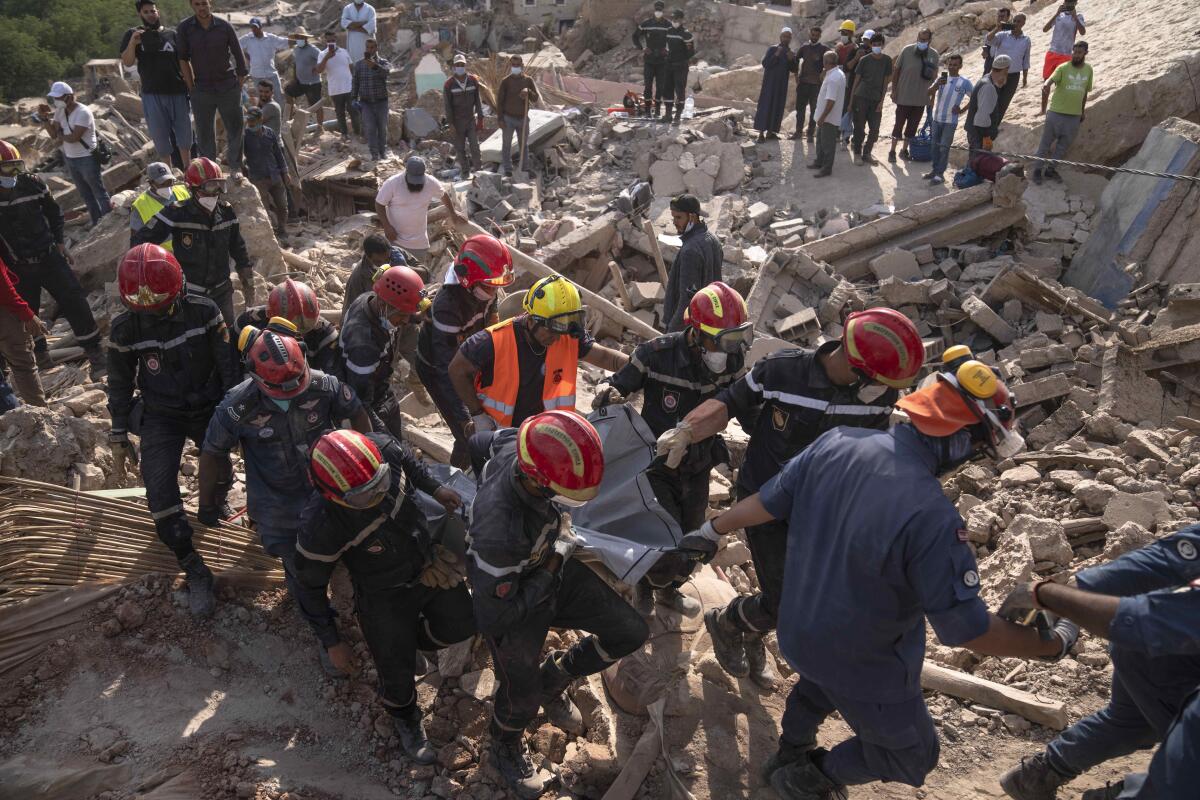Responders dig for bodies in devastated Moroccan mountain villages

- Share via
IMI N'TALA, Morocco — The stench of death wafted through the village of Imi N’Tala high up in Morocco’s Atlas Mountains, where last week’s catastrophic earth- quake razed the hamlet’s mud-brick buildings and killed dozens of residents.
Bulldozers and responders have been digging through the wreckage around the clock in the hopes of finding the eight to 10 corpses still underneath, even as an aftershock Wednesday evening rattled frayed nerves.
“The mountain was split in half and started falling. Houses were fully destroyed,” a local man, Ait Ougadir Al Houcine, said Tuesday as crews worked to recover bodies, including his sister’s. “Some people lost all their cattle. We have nothing but the clothes we’re wearing. Everything is gone.”
The scene in Imi N’Tala, which is mainly home to herders and farmers and which lost 96 people to Friday’s quake, mirrored the situation in dozens of communities along the treacherous mountain roads south of Marrakech. Men in donated djellabas — long, loose robes common in Morocco — neatly arranged their prayer rugs atop dust and rocks when they were unable to find open space and solid ground. Donkeys brayed as they passed people covering their noses to block the smell of decomposition.
In Morocco, an earthquake left thousands dead. In Libya, floods washed neighborhoods away. But lifesaving help is snarled in politics and rivalries.
The death and injury counts have risen as responders have reached more of these remote villages, where they dug up bodies and sent people to hospitals. Moroccan authorities reported 2,901 deaths and several thousand injuries as of Tuesday. The United Nations estimated that the magnitude 6.8 quake had affected some 300,000 people.
On Tuesday, King Mohammed VI visited a hospital and donated blood in Marrakech, which is about 40 miles north of Imi N’Tala. Aid finally arrived in Imi N’Tala and the nearby communities of Anougal, Imi N’Isli and Igourdane. White and yellow tents lined the partially paved roads, pyramids of water bottles and milk cartons were stacked nearby, and Moroccans from the country’s larger cities handed out clay tagine pots and neatly packed bags of food aid.
Camera crews from France, Spain and Qatar’s Al Jazeera set up as Moroccan emergency responders — along with crews from Qatar, Spain and international nongovernmental organizations — jackhammered through rocks to recover a woman’s body from under a crumbling house that looked like it could fall at any moment.
She probably died because, unlike the buildings that fell in Turkey and Syria’s earthquake earlier this year, the mud bricks used to build homes in Imi N’Tala left little space for air that trapped people would need to survive, said Patrick Villadry of the French rescue crew ULIS.
Days after the 6.8 earthquake rocked the country of Morocco, seismologists discuss the temblor’s impact on the nation’s people.
“When we dig, we look for someone alive. From there, we don’t ask ourselves questions. If they’re alive, great. If they’re dead, it’s a shame,” he said, noting that recovering the dead was important for Moroccan families.
Morocco has limited the amount of earthquake aid allowed into the country and permitted response crews from only four countries — Spain, the United Kingdom, the United Arab Emirates and Qatar — and nongovernmental organizations. Villadry’s five-person, four-dog crew from Nice was among the few French NGOs to have made it to the disaster site. It arrived Saturday, he said.
Though the government has cautioned that poorly coordinated aid “would be counterproductive,” the explanation has prompted skepticism among some Moroccans, including Brahim Ait Blasri, who watched the recovery attempts in Imi N’Tala.
“It’s not true. It’s politics,” he said, referring to Morocco’s decision not to accept aid from countries such as the U.S. and France. “We have to set aside our pride. This is too much.”
Associated Press writers John Leicester and Elaine Ganley in Paris, and Mark Carlson in Imi N’Tala contributed to this report.
More to Read
Sign up for Essential California
The most important California stories and recommendations in your inbox every morning.
You may occasionally receive promotional content from the Los Angeles Times.















